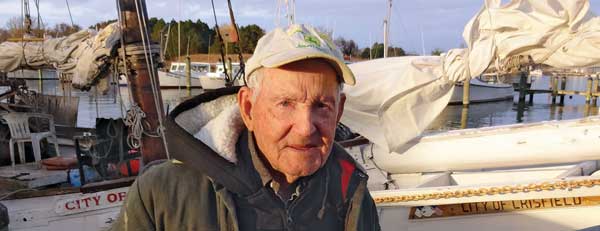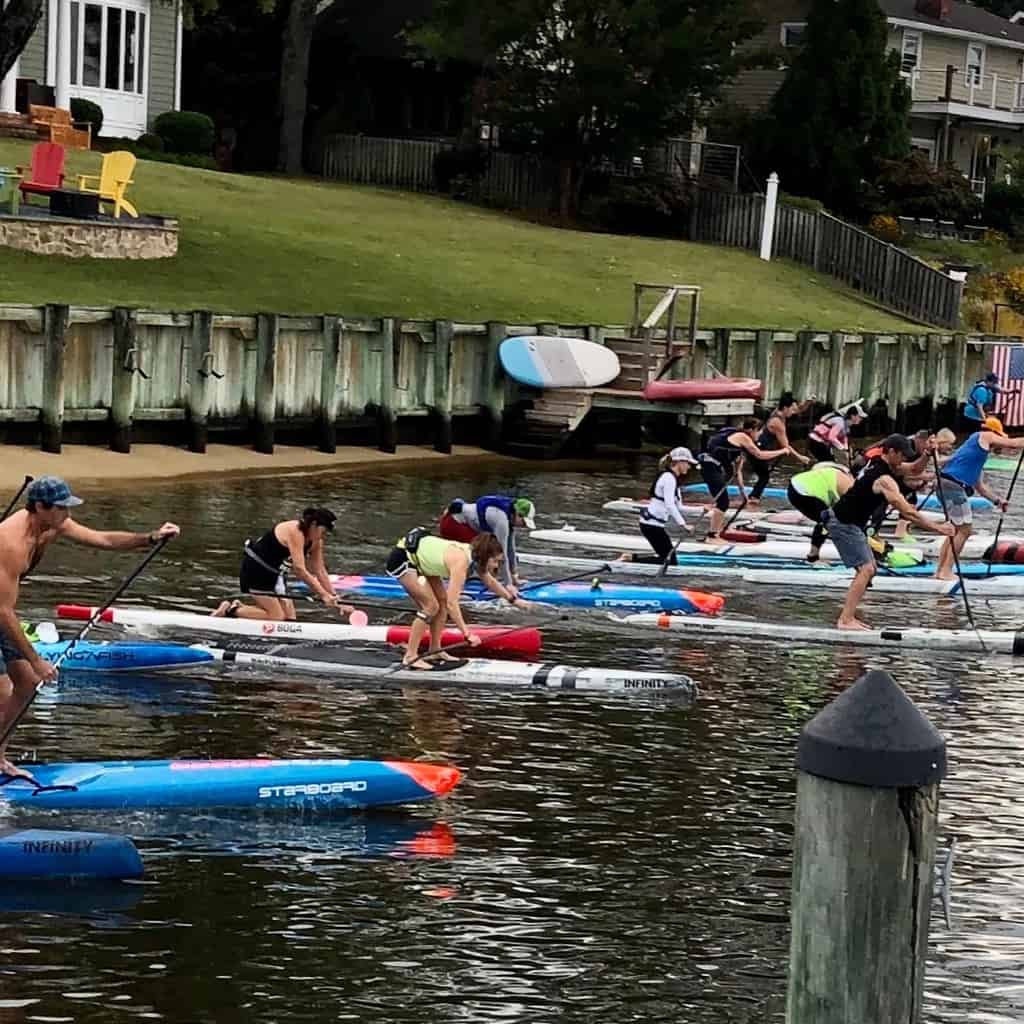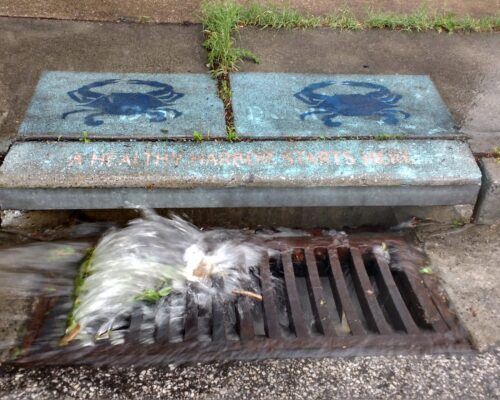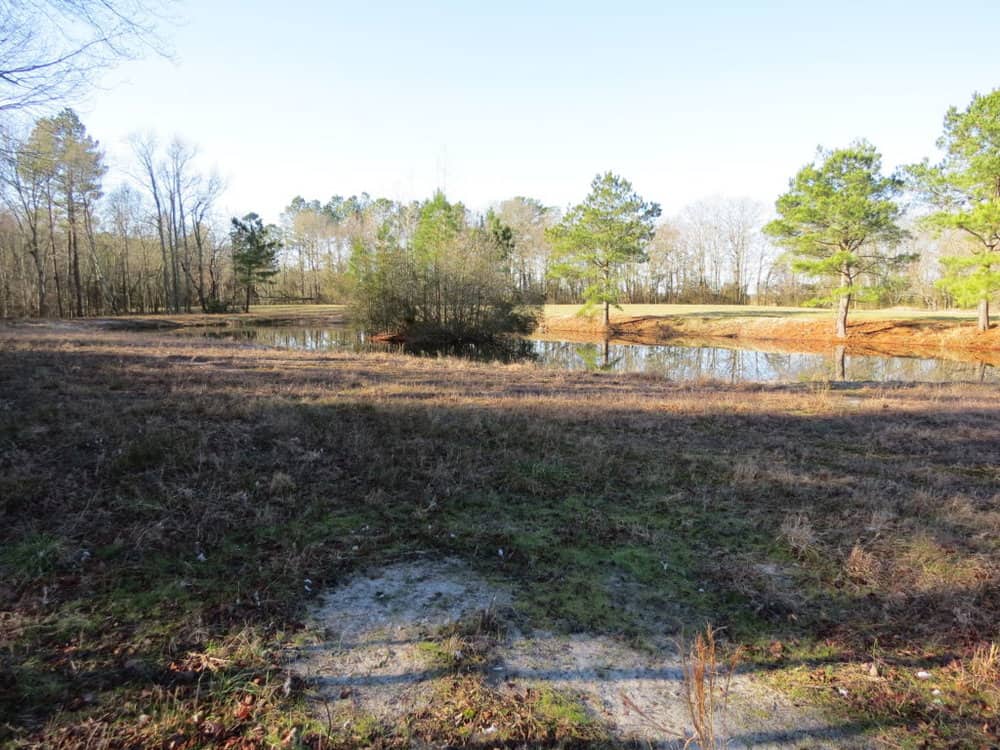by Brice Stump
Art Daniel has measured out his life in bushels of crabs, oysters and years at the wheel of the City of Crisfield, which he has owned since 1951, when he was 30. At 94, “Daddy Art,” has a job unlike any other his age. The Deal Island native is not only the oldest skipjack captain on the Bay, he has had his boat longer than any other skipjack owner.
“Captain Gus Forbush out of Crisfield built her. He named her. I didn’t change it when I got it, thought that was a good name—City of Crisfield,” Captain Daniel said.
The 46-foot-long boat, one of about a dozen skipjacks still dredging the Bay, has been as much a part of his life as his family.
“I love that boat just like I love my wife, maybe sometimes more,” he said, ending his sentence with an easy, engaging smile and a laugh that fades in a soft chuckle.
“For a few years, when I was young, I was workin’ somebody else’s boat, but the City of Crisfield has always been my boat. When I first saw her I fell in love with her. It was my desire to get her home and never let ’er go. She has served me very well.”
Come dredging time, and aboard the City of Crisfield, he is young again, immortal, a man who is lord of worn sails filled with wind and of the groaning timbers on the ship of his dreams.
“I think the Lord had it planned that it was my lot in life to be a waterman. Workin’ on the water you are always doin’ a little something and can make a few dollars to pay the bills.
“You could catch a lot more oysters way back, but the market price wasn’t there,” he said. “There was no money. You could work all day long and get a dollar, and was happy to get it.
“You had to have a garden if you wanted anything to eat. We raised a couple of hogs, and the island women would salt fish up for the winter. Back then every man down here worked on the water or you didn’t work on Deal Island.”
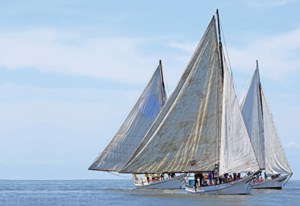
In the summer Captain Daniel fishes up a couple of crab bank traps that provide him with a mess of fresh blue crabs. “It gives us plenty of crabs and enough to give away to friends and family,” he said.
Captain Daniel lives in Wenona, the village on Deal Island where he was born. He was one of 12 children in the family of nine girls and three boys.
In 1941, at 20, he married 18-year-old Ladelle Webster, the girl next door. After 68 years of marriage, she died in 2009. Daniel remarried in 2010 to Stella White, an islander he has known all his life. Both women had fathers who were skipjack captains. “She keeps me goin’ now,” he said with a wink. He wants to teach her to take the helm of the City of Crisfield.
Yet there are reservations. “When we go through a gale of wind, my boat might go ten or eleven miles per hour. That kind of wind doesn’t scare me as long as I’m the captain, but if it was somebody else handlin’ the boat I might get a little scared ’cause I’d be afraid he’d do the wrong thing.”
In his last season Daniel was dredging with a six-man crew, sometimes including grandsons and his son, Reverend Bob Daniels [sic; see sidebar]. The captain moved across the deck with speed and agility, an unexpected boyish vigor that never failed to surprise his crewmen who were on their knees, heads low to their chests as they dug though the black, muddy dredge pile looking for legal oysters.
“In my day,” the captain said, “men didn’t get down on their knees. They were suppose’ to bend way over and cull through them oysters. But now they learned better, they fall to their knees. Even my boys culled on their knees to save their backs.”
Crews have changed often over the years, but there was one constant. There always seemed to be someone from the crew who is rich by Friday and, come Monday, has to borrow money from the captain. “I hate doin’ it, but you have to do it. Crew is hard to get.”
Skipjack captains also deal with the lack of experience that comes with revolving crews. Though skipjacks can dredge five days a week, Daniel opted to go out only on the two power days, when regulations allow a skipjack to be pushed over oyster grounds by a small motorized yawl boat at the stern. The three sail days went unused, as fewer crewmen were familiar with the workings and handling of the sails and the dangers of a jibing boom.
In the old days, Daniel recalled, men all but fought to be among skipjack crews. All had experience, all were local, and each man worked hard to keep his job. Life was different then.
“When I was a boy I worked with my father, Arthur, ’board his skipjack, the America, and then the Robert L. Tawes. We used to go up around Annapolis working on grounds up there and stayin’ in ports around there and live on the boat in the winter,” the captain recalled.
When he was in the 10th grade, his father took him out of school to dredge oysters. He never returned to classes.
“We wrapped up in plenty of big blankets ’cause there was no heat in the cabin,” he said. A metal bucket was the chamber pot. The cabin light was a kerosene lamp, lit only as needed. There was no radio, no TV—just the sound of the water lapping against the hull and the cold humidity from water leaking into the dark space below the cramped bunks. The cook got up around midnight to put wood in the small stove to get ready for breakfast.
“In bed by nine, up at four. How you got up was smellin’ the cook fixin’ breakfast, the smell of that food comin’ in there on ya, you’re ready to keep up then. All you could eat, and there was some big eaters onboard. We ‘et’ good,” Captain Daniel said with a nod.
“When I was a little boy we’d look for Poppa to come home for Christmas. All us kids were excited because we knew there was one special thing he would bring—a big bunch of bananas,” he said, eyes still bright with excitement.
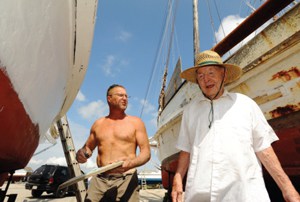
Even when he was working the upper Bay as an adult, Daniel said it was always a tradition that the skipjacks came home for the holidays. One Christmas the weather was so cold that the spray froze over the bow, coating the bowsprit chains on the skipjack with heavy ice.
“It was the deadliest task to get them boys up there knocking off the ice with hammers,” he said. “But the weight of the ice was pulling the bow down. We left Annapolis first thing in the morning and the ice on the Bay got ahead of us, blocked us in off of Kedges Straits Lighthouse. The whole day and evening we got off the boat onto the ice to beat and break it up until we got through. The boat was tremblin’ goin’ through that ice.
“It was Christmas Eve and getting dark fast. We could see the lights of our homes, but didn’t think we were going to make it. But the boys were young and strong and kept beating the ice with shovels and hammers and we got home. We didn’t miss Christmas.”
Between his words, the nostalgic essence of a time that lingered like the chilly fog at sunrise.
He could taste his own maritime history in the salt spray that broke over the bow. Decades of winters on the Chesapeake Bay, and thousands of bushels of crusty, hard, gray oysters later, Daniel is still in love with dredging. The Bay is more than a part of his life, it is his life. He will never be too old to be at the wheel of the City of Crisfield, he said.
Some men say, “ ‘Daddy Art, it’s time for you to set home and we’ll work the boat.’ But they can’t work it like me yet a while. As long as it’s my boat, I’m goin’ to stay there with it. You can’t let someone else run your boat; you’ll end up in the mire. This captain is the head of the boat.
“On my boat it’s ‘Daddy Art’s way or no way at all.’ That’s the way it’s got to be. You are either the captain or you’re nothin’. They are the crew. I do my job and they do theirs.”
When I interviewed him, lean and spry on the deck of his beloved skipjack, Daniel was quick to take pride in his age and health. “I’m the oldest man now on the island, but I don’t feel old. I don’t take no pills either, except for vitamins. I can do my work like a young person, that’s how good the Good Lord has been to me. I can work as good as a twenty-five-year-old boy. I don’t feel like I’m a livin’ antique, I’m just one of the boys.”
Religion has always been close to Art Daniel’s heart and the trailboard of his skipjack features a dove with an olive branch and a Christian flag. He used to sing the old hymns of his youth with his son, Stan, 73, with a strong voice that resonated deep in the listener’s chest. The two were regulars at St. Paul’s Methodist Church in Wenona and were frequent guest singers at area churches.
His life has been his faith, his family, his skipjack and the Chesapeake Bay. He can’t imagine life in a rocking chair.
“Yes indeedy, it’s still fun workin’ on the water,” he said. “It’s an adventure, greatest thing in the world. You’re always looking for that oyster goldmine. I’m always lookin’ for that next good lick of oysters.”
Award-winning Eastern Shore writer and photographer Brice Stump likes nothing better than to try and get one up on seasoned and tenacious flea market vendors.

